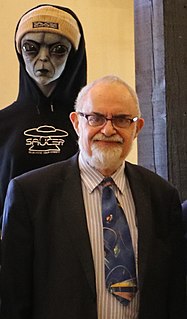A Quote by Nathan Myhrvold
Most visions of extraterrestrial life are actually steeped in human hubris. The fictional extraterrestrials of 'Star Trek' or a hundred other space operas are less alien than many of my neighbors. And funny, the ones running the place are mostly WASPish men.
Related Quotes
Star Trek speaks to some basic human needs: that there is a tomorrow — it's not all going to be over with a big flash and a bomb; that the human race is improving; that we have things to be proud of as humans. No, ancient astronauts did not build the pyramids — human beings built them, because they're clever and they work hard. And Star Trek is about those things.
I don't think I'm the world's most die-hard sci-fi fan, but I definitely grew up watching 'Star Trek' religiously - all of them: the original, 'Next Generation,' 'Deep Space Nine,' 'Voyager.' I think sci-fi has an important place in the cinema world. Fantasy is a big part of why films actually exist.
The evidence is overwhelming that Planet Earth is being visited by intelligently controlled extraterrestrial spacecraft. In other words, SOME UFOs are alien spacecraft. Most are not. It's clear from the Opinion Polls and my own experience, that indeed most people accept the notion that SOME UFOs are alien spacecraft. The greater the education, the MORE likely to accept this proposition


































